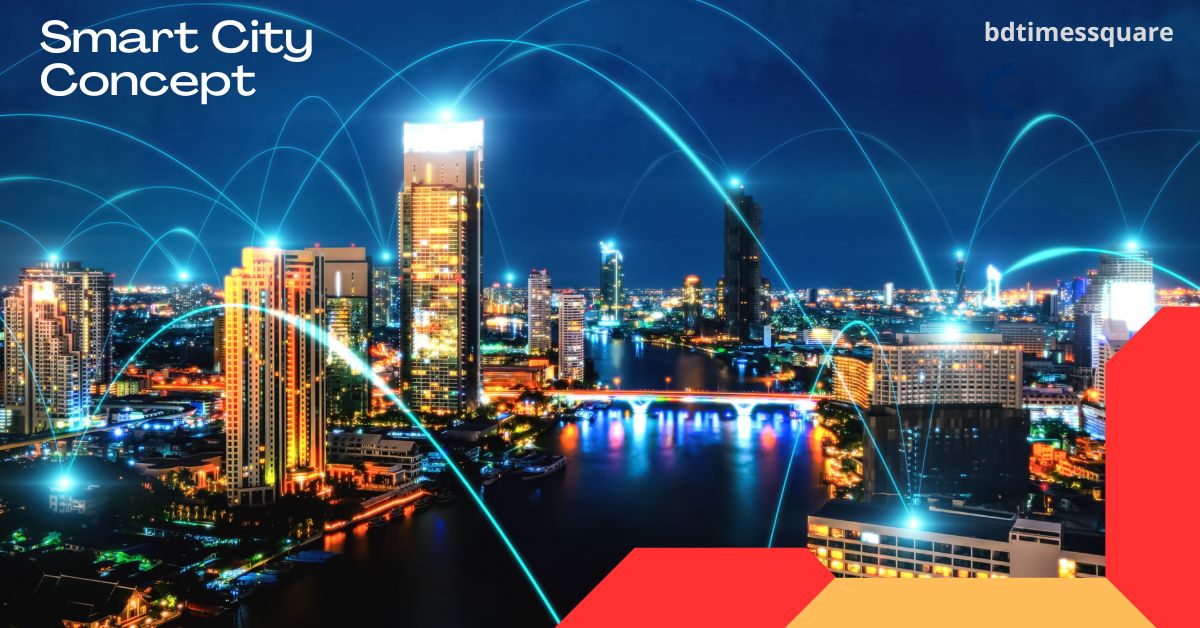
Introduction:
Are you tired of living in cities that feel dull and disconnected from the world around us? Do you ever dream of a place where technology intertwines seamlessly with our daily lives, making everything smarter, more efficient, and simply more enjoyable? Well, buckle up and get ready to dive into the fascinating world of smart cities!
In this article, we’ll on a journey to explore the smart city concept and what they should truly be. But hold on, and I promise this won’t be your typical dull, technical read. We’re going to take a detour from the formalities and dive into a conversation that’s light-hearted, witty, and engaging. So, grab a cup of coffee, sit back, and let’s dive into this adventure together.
Imagine a city that’s like a superhero, equipped with extraordinary powers to tackle everyday challenges. It’s a place where the streets are alive with the hum of smart technologies, where efficiency and sustainability go hand in hand, and where citizens thrive in an ecosystem designed to make their lives easier. Think of it as a city that’s not just smart but also clever, like a well-dressed spy who always knows what’s going on.
But what exactly makes a city smart? How can we transform our urban landscapes into these futuristic havens? We’ll delve into the core concepts behind smart cities and take a closer look at some revolutionary ideas that are reshaping the way we live, work, and play.
From cutting-edge technologies and innovative approaches to success stories happening around the globe, we’ll explore how these ideas can be adapted and implemented right here in Bangladesh. We’ll uncover the components of a comprehensive smart city project, including e-governance, waste management, water conservation, sustainable energy practices, and much more.
But it’s not just about the technology; it’s about how real estate developers like Bd Times Square are playing a crucial role in shaping the smart cities of tomorrow. We’ll uncover their strategies, their integration of technology and sustainability, and how they’re turning dreams into reality.
So, are you ready to be amazed? Join us on this thrilling expedition as we unravel the wonders of smart cities and discover what the future holds for urban living. Get ready to witness the transformation of cities into vibrant, intelligent, and livable spaces that will leave you in awe. Together, let’s build a world where technology and humanity coexist harmoniously, paving the way for a brighter, smarter future. Let’s dive in!
What is the Smart City Concept in Bangladesh?
The Smart City concept in Bangladesh aims to revolutionize urban development by integrating innovative technology and sustainable practices. Cities like Dhaka and Chittagong are embracing smart solutions to enhance efficiency, connectivity, and the overall quality of life for residents. These initiatives include smart transportation systems, energy-efficient infrastructure, digital governance, and improved public services. By leveraging advancements in digital infrastructure, IoT, and data analytics, Bangladesh is taking significant strides towards creating smarter and more sustainable cities. The Smart City concept in Bangladesh is a testament to the country’s commitment to sustainable urban development and improving the lives of its citizens.
Understanding the core concept of a smart city
A smart city is not just about using advanced technologies; it’s about creating a sustainable and efficient urban environment that enhances the quality of life for its residents. In Bangladesh, the concept of a smart city revolves around leveraging technology to address the unique challenges faced by its cities.
Smart city initiatives and projects in Bangladesh
Bangladesh has recognized the importance of smart cities and has embarked on various initiatives to transform its urban landscapes. Projects such as the bd timessquare project aim to incorporate technology-driven solutions to improve governance, infrastructure, and service delivery.
Key objectives and goals of smart cities in the context of Bangladesh
The primary objective of smart city projects in Bangladesh is to enhance the livability and sustainability of urban areas. This includes improving transportation systems, reducing pollution, optimizing resource management, and promoting citizen participation in decision-making processes.
Revolutionary Ideas in Making a City “Smart”:
Innovative technologies and approaches transforming cities:
Cities around the world are adopting innovative technologies to tackle urban challenges. From the Internet of Things (IoT) to artificial intelligence (AI), these advancements have the potential to revolutionize how cities function and improve the lives of their residents.
Examples of successful smart city projects from around the world:
Cities like New York, London, Tokyo, Shanghai, Dubai, Silicon Valley, and Singapore have implemented successful smart city projects that have transformed their urban landscapes. These projects range from smart transportation systems and energy-efficient buildings to integrated data platforms that enhance citizen engagement.
How these ideas can be adapted and implemented in Bangladesh
Bangladesh can draw inspiration from these global success stories and adapt them to its unique context. By leveraging its technological capabilities and fostering collaborations, Bangladesh can develop innovative solutions to address its urban challenges.
Exploring the Components of a Smart City Project
Overview of a comprehensive smart city project:
A comprehensive smart city project encompasses various components that work together to create a sustainable and efficient urban ecosystem. These components include smart governance, efficient waste management, water conservation, sustainable energy management, and improved urban mobility.
E-Governance and Citizen Services in a smart city:
Smart cities prioritize digital transformation in governance processes, enabling efficient service delivery and citizen participation. Through e-governance initiatives, citizens can access government services online, participate in decision-making processes, and provide feedback to improve service quality.
Waste Management solutions for a cleaner environment:
Waste management is a critical aspect of a smart city project. Implementing smart waste management systems, such as sensor-based bins and waste segregation programs, can lead to cleaner and healthier cities.
Efficient Water Management Strategies:
Water scarcity is a pressing issue in many urban areas. Smart cities employ innovative water management strategies like rainwater harvesting, leak detection systems, and water usage monitoring to ensure efficient use of this precious resource.
Sustainable Energy Management Techniques:
Smart cities prioritize sustainable energy management by promoting renewable energy sources, implementing energy-efficient infrastructure, and utilizing smart grids to optimize energy distribution.
Enhancing Urban Mobility with smart transportation solutions:
Efficient transportation systems are vital for smart cities. By integrating smart technologies in public transportation, implementing intelligent traffic management systems, and promoting non-motorized transportation options, cities can reduce congestion and improve mobility.
Other potential aspects of a smart city project:
Smart city projects may encompass additional components such as smart healthcare systems, education initiatives, and public safety measures, all aimed at creating a holistic urban environment.
Current Smart City Technologies
Introduction to modern smart city technologies:
Today, a wide range of technologies contribute to the development of smart cities. These include IoT devices, data analytics, cloud computing, AI-powered solutions, and advanced communication networks.
Implementing smart infrastructure for better connectivity:
Smart infrastructure plays a crucial role in enabling seamless connectivity within a smart city. High-speed internet access, smart grids, and sensor networks form the backbone of a digitally connected urban ecosystem.
Enhancing road management through technology:
Smart technologies can significantly improve road management and traffic flow. Intelligent traffic monitoring systems, real-time updates, and smart traffic signals help in reducing congestion and improving road safety.
Smart traffic management for congestion reduction:
Traffic congestion is a common problem in urban areas. Smart traffic management systems utilize real-time data, predictive analytics, and adaptive traffic control algorithms to optimize traffic flow and reduce congestion.
Efficient Smart Parking Systems:
Finding parking spaces in crowded cities can be a challenge. Smart parking systems leverage sensors, mobile applications, and data analytics to guide drivers to available parking spaces, reducing the time spent searching for parking.
Innovations in Smart Waste Management:
Smart waste management solutions employ sensors, RFID tags, and data analytics to optimize waste collection routes, reduce overflowing bins, and promote recycling initiatives.
Sustainable Solutions for Smart Water Management:
Smart water management technologies enable precise monitoring of water usage, leak detection, and real-time data analysis, leading to efficient water conservation efforts and improved water quality.
How Real Estate Companies like Bd Times Square Develop Smart Cities
Role of real estate developers in shaping smart cities:
Real estate developers play a crucial role in the development of smart cities. By integrating smart technologies and sustainable practices into their projects, they contribute to creating future-ready urban environments.
Case study: Bd Times Square’s approach to creating smart cities:
Hey there, fellow dreamers! Have you heard about bd times square? They’re like the superheroes of real estate in Bangladesh, creating the first ever smart city in Purbachal, Dhaka , a place where technology and nature dance hand in hand, where you can live the high life while being surrounded by greenery. They’re not just offering you a plot of land; they’re giving you the key to a luxurious lifestyle. It’s like winning the lottery and getting a magic carpet ride all in one! Who wouldn’t want to be a part of this futuristic wonderland? So, why settle for ordinary when you can have extraordinary? Join the bdtimessquare revolution and live your best life in the lap of luxury!
Bd Times Square has taken significant steps towards developing smart cities in Bangladesh. Their projects incorporate smart infrastructure, renewable energy systems, and digital connectivity to provide residents with a sustainable and technologically advanced living experience.
Integrating technology and sustainability in urban development:
Real estate companies like Bd Times Square emphasize the integration of technology and sustainability in their urban development projects. By incorporating green building practices, energy-efficient designs, and smart home automation, they create environmentally-friendly and future-proof communities.
Conclusion:
As Bangladesh continues to urbanize, the concept of smart cities becomes increasingly important. By leveraging technology and adopting innovative approaches, smart cities have the potential to address urban challenges, enhance quality of life, and create sustainable and efficient urban environments.
FAQs
How can smart city initiatives benefit the citizens of Bangladesh?
Smart city initiatives can benefit citizens by improving service delivery, reducing congestion, promoting sustainability, and enhancing citizen participation in governance processes.
Are smart cities only about technology?
No, smart cities are not solely about technology. They are about creating sustainable and efficient urban environments that improve the quality of life for residents.
What are some potential challenges in implementing smart city projects in Bangladesh?
Some challenges include infrastructure limitations, funding constraints, data privacy concerns, and ensuring inclusivity in technological advancements.
How can citizens contribute to the development of smart cities?
Citizens can contribute by actively participating in decision-making processes, adopting sustainable practices, utilizing smart city services, and providing feedback to improve the urban environment.
What is the future of smart cities in Bangladesh?
The future of smart cities in Bangladesh is promising. With ongoing initiatives and collaborations, the country has the potential to create sustainable and technologically advanced urban environments.




